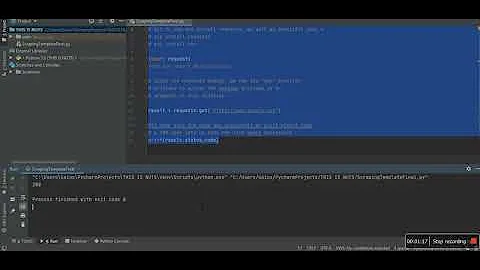"No module named 'pysqlite2'" Error
7,281
I found the main problem! When I was installing virtualenv I didn't use root, so some files were missing.
When setting up your virtualenv, start a root shell
sudo -i
then you can run this command:
pip install virtualenv
By doing so, you can run Python3.4 and Django1.7 at the same time!
Alternatively, in my case:
Virtualenv was set by python3.4, and I think it's not synchronized with other versions.
I set virtualenv to use python2.7:
$ which python
/usr/bin/python
$ virtualenv -p /usr/bin/python
and this time, everything was OK.
Related videos on Youtube
Comments
-
 Alireza Ghaffari over 1 year
Alireza Ghaffari over 1 yearI am trying to run a server, but I get this error:
$ python manage.py runserver Traceback (most recent call last): File "/home/user/Demo/lib/python3.4/site-packages/django/db/backends/sqlite3/base.py", line 33, in <module> from pysqlite2 import dbapi2 as Database ImportError: No module named 'pysqlite2' During handling of the above exception, another exception occurred: Traceback (most recent call last): File "/home/user/Demo/lib/python3.4/site-packages/django/db/backends/sqlite3/base.py", line 35, in <module> from sqlite3 import dbapi2 as Database File "/usr/local/lib/python3.4/sqlite3/__init__.py", line 23, in <module> from sqlite3.dbapi2 import * File "/usr/local/lib/python3.4/sqlite3/dbapi2.py", line 27, in <module> from _sqlite3 import * ImportError: No module named '_sqlite3' During handling of the above exception, another exception occurred: Traceback (most recent call last): File "manage.py", line 10, in <module> execute_from_command_line(sys.argv) File "/home/user/Demo/lib/python3.4/site-packages/django/core/management/__init__.py", line 385, in execute_from_command_line utility.execute() File "/home/user/Demo/lib/python3.4/site-packages/django/core/management/__init__.py", line 354, in execute django.setup() File "/home/user/Demo/lib/python3.4/site-packages/django/__init__.py", line 21, in setup apps.populate(settings.INSTALLED_APPS) File "/home/user/Demo/lib/python3.4/site-packages/django/apps/registry.py", line 108, in populate app_config.import_models(all_models) File "/home/user/Demo/lib/python3.4/site-packages/django/apps/config.py", line 202, in import_models self.models_module = import_module(models_module_name) File "/home/user/Demo/lib/python3.4/importlib/__init__.py", line 109, in import_module return _bootstrap._gcd_import(name[level:], package, level) File "<frozen importlib._bootstrap>", line 2254, in _gcd_import File "<frozen importlib._bootstrap>", line 2237, in _find_and_load File "<frozen importlib._bootstrap>", line 2226, in _find_and_load_unlocked File "<frozen importlib._bootstrap>", line 1200, in _load_unlocked File "<frozen importlib._bootstrap>", line 1129, in _exec File "<frozen importlib._bootstrap>", line 1471, in exec_module File "<frozen importlib._bootstrap>", line 321, in _call_with_frames_removed File "/home/user/Demo/lib/python3.4/site-packages/django/contrib/auth/models.py", line 40, in <module> class Permission(models.Model): File "/home/user/Demo/lib/python3.4/site-packages/django/db/models/base.py", line 122, in __new__ new_class.add_to_class('_meta', Options(meta, **kwargs)) File "/home/user/Demo/lib/python3.4/site-packages/django/db/models/base.py", line 297, in add_to_class value.contribute_to_class(cls, name) File "/home/user/Demo/lib/python3.4/site-packages/django/db/models/options.py", line 166, in contribute_to_class self.db_table = truncate_name(self.db_table, connection.ops.max_name_length()) File "/home/user/Demo/lib/python3.4/site-packages/django/db/__init__.py", line 40, in __getattr__ return getattr(connections[DEFAULT_DB_ALIAS], item) File "/home/user/Demo/lib/python3.4/site-packages/django/db/utils.py", line 242, in __getitem__ backend = load_backend(db['ENGINE']) File "/home/user/Demo/lib/python3.4/site-packages/django/db/utils.py", line 108, in load_backend return import_module('%s.base' % backend_name) File "/home/user/Demo/lib/python3.4/importlib/__init__.py", line 109, in import_module return _bootstrap._gcd_import(name[level:], package, level) File "<frozen importlib._bootstrap>", line 2254, in _gcd_import File "<frozen importlib._bootstrap>", line 2237, in _find_and_load File "<frozen importlib._bootstrap>", line 2226, in _find_and_load_unlocked File "<frozen importlib._bootstrap>", line 1200, in _load_unlocked File "<frozen importlib._bootstrap>", line 1129, in _exec File "<frozen importlib._bootstrap>", line 1471, in exec_module File "<frozen importlib._bootstrap>", line 321, in _call_with_frames_removed File "/home/user/Demo/lib/python3.4/site-packages/django/db/backends/sqlite3/base.py", line 38, in <module> raise ImproperlyConfigured("Error loading either pysqlite2 or sqlite3 modules (tried in that order): %s" % exc) django.core.exceptions.ImproperlyConfigured: Error loading either pysqlite2 or sqlite3 modules (tried in that order): No module named '_sqlite3'and when I try to install Sqlite:
$ pip install sqlightCollecting sqlight Could not find any downloads that satisfy the requirement sqlight No distributions at all found for sqlightWhat should I do?
-
Jos over 9 yearsHave you installed SQLite3?
sudo apt-get install sqlite3 -
 Sylvain Pineau over 9 yearsTry the solutions proposed in this SO question: stackoverflow.com/questions/1210664/no-module-named-sqlite3
Sylvain Pineau over 9 yearsTry the solutions proposed in this SO question: stackoverflow.com/questions/1210664/no-module-named-sqlite3 -
 Alireza Ghaffari over 9 years@jos Yes it was installed: but now I am giving that error as well.
Alireza Ghaffari over 9 years@jos Yes it was installed: but now I am giving that error as well. -
 Alireza Ghaffari over 9 years@SylvainPineau I've installed libsqlite3-dev as well
Alireza Ghaffari over 9 years@SylvainPineau I've installed libsqlite3-dev as well -
 Alireza Ghaffari over 9 years_sqlite3.so doesn't exist! in /usr/local -name _sqlite3.so
Alireza Ghaffari over 9 years_sqlite3.so doesn't exist! in /usr/local -name _sqlite3.so -
Jos over 9 yearsSQLight? Did you mean SQLite?
-
 Alireza Ghaffari over 9 yearsI found its problems eventually!!! the below solution in the answer section.
Alireza Ghaffari over 9 yearsI found its problems eventually!!! the below solution in the answer section.
-


![#python #module [Solved] "ModuleNotFoundError: No module named" Error](https://i.ytimg.com/vi/3MopyxN62Xw/hq720.jpg?sqp=-oaymwEcCNAFEJQDSFXyq4qpAw4IARUAAIhCGAFwAcABBg==&rs=AOn4CLALWJEC_bxfDUO2uo5R3D_X3vIlWg)





![importError: No system module 'pywintypes' [Python 3.9.1 Fix] 2021](https://i.ytimg.com/vi/8s0b_Tmxad8/hq720.jpg?sqp=-oaymwEcCNAFEJQDSFXyq4qpAw4IARUAAIhCGAFwAcABBg==&rs=AOn4CLB_yoVqHzcKnqeiPrT52UQ7AZVqrA)